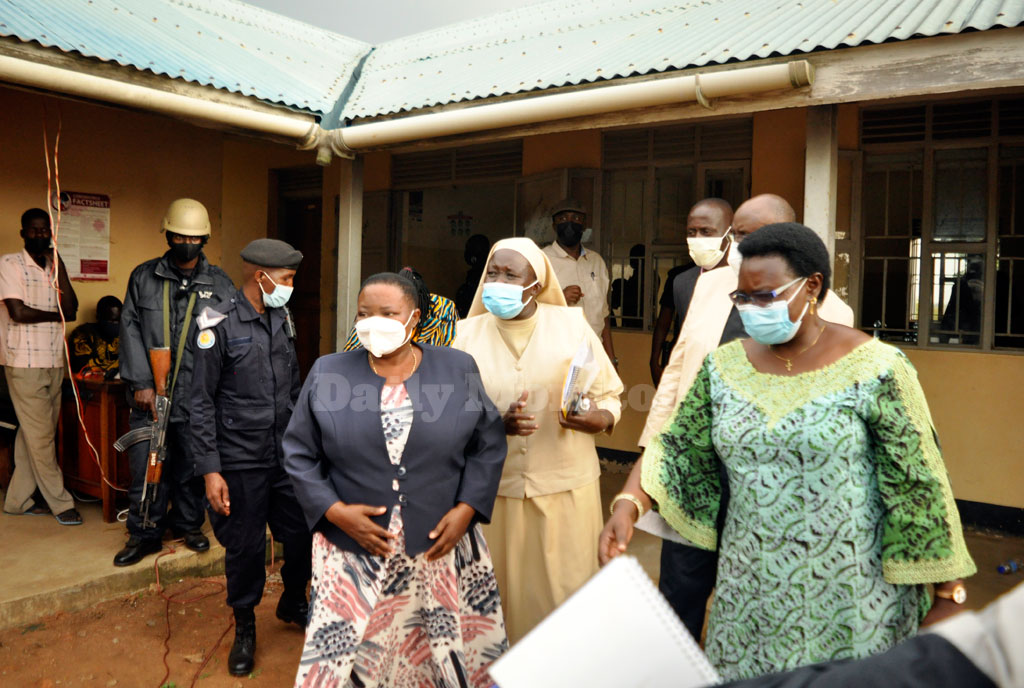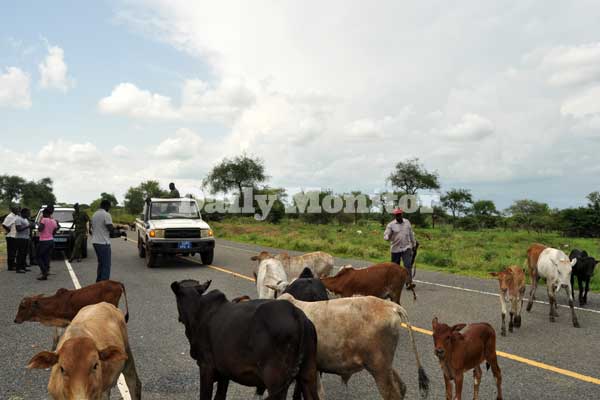Prime
Register all Balaalo in Acholi, Nabbanja orders

Prime Minister Robinah Nabbanja(left) and State Minister for Northern Uganda Grace Kwiyucwiny (right) after the meeting at Palaro Sub-county headquarters in Gulu on Thursday. PHOTO/ TOBBIAS JOLLY OWINY
What you need to know:
- The premier says the move is intended to enable government to have proper records of the herdsmen and ensure none of them is left behind once eviction starts.
Prime Minister Robinah Nabbanja has directed security authorities in Acholi sub-region to conduct fresh registration of all herdsmen (Balaalo) in the region ahead of the scheduled eviction in six weeks.
While meeting locals, security and political leaders at Palaro Sub-county headquarters in Gulu on Thursday, Ms Nabbanja said the registration is to enable the government to have proper records of the herdsmen and ensure none of them is left behind once eviction starts.
She was in the area to launch the eviction drive that is meant to kick off in six weeks, according to a recent directive by President Museveni.
She was joined by State Minister for Agriculture and Animal Industry Bright Rwamirama, State Minister for Gender Charles Okello Engola, State for Internal Affairs Gen David Muhoozi, and State Minister for Northern Uganda Grace Kwiyucwiny, among others.
“Let us have every herdsman in the region registered, let us know how many animals they have. Let the Resident District Commissioners (RDCs), the Regional Internal Security Officers (RISOs), District Police Commanders (DPC), LC5, LC3 handle this issue squarely,” she told the gathering.
According to the premier, having clear records of the herdsmen will ensure none of them hides during the eviction process like it occurred in the past.
She said it was upon the RDCs, GISOs, DPCs, among others to ensure that all the herdsmen are registered while Gen Muhoozi and his team provide the technical backup in the process.
“You don’t expect Gen Muhoozi to run after Balaalo to register them, we are going to use you because you know all the data about them while the technical team offers the required support,” she stated.
She, however, warned Acholi leaders against conniving with the herdsmen and allowing them to return to their areas once they are evicted.
“The herdsmen came here on their own through connivance with the local leaders, government has nothing to do with their influx. There is a lot of connivance,” she said.
Gen Muhoozi said he and his team are already on the ground to map and plan on how to execute the eviction exercise.
“We have practically been left with six weeks to do this job and complete it. We visited several hotspots, including Palaro; we shall remain here and even go deeper in these communities to see where the problems are to make informed decisions,” Gen Muhoozi said.
“We have so far got information, including the irregular acquisition of land, encroachment, reports of guns and of infiltration by foreigners into our country to do other things that might impede our security in future, he added.
Museveni directive
On November 2, President Museveni issued a two-month ultimatum to the Balaalo herdsmen to vacate northern Uganda or face forceful eviction and prosecution.
In the letter addressed to Ms Nabbanja, a copy of which Sunday Monitor has seen, Mr Museveni describes the herdsmen as illegal migrants whose animals remain a persistent problem to the farming communities in the north, specifically the Acholi sub-region.
In the letter, Mr Museveni stated that the herdsmen did not follow the procedures involved to move their animals to the north, noting that their illegal activities were tainting the image of his government.
This is the second time Mr Museveni is issuing a directive following the first one four years ago.
On October 24, 2017, President Museveni directed the army and the Agriculture ministry to evict the Balaalo pastoralists from northern Uganda.
The directive was in reaction to claims from the leadership across the sub-region that the pastoralists’ population had swollen and was hampering farming as their animals strayed into farmlands and destroyed crops.




